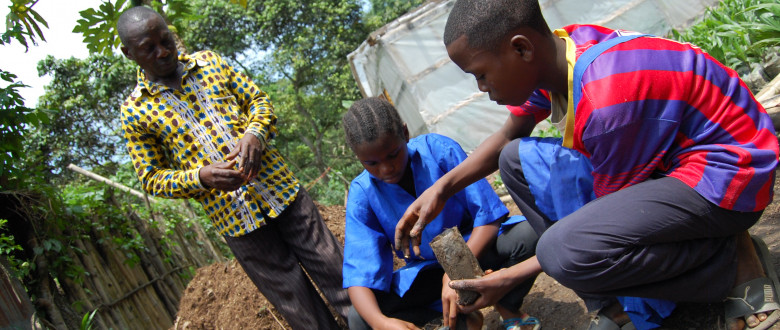
The European Week of Action for Girls (10 – 14 October) is all about GIRL POWER. An ideal opportunity to reflect on just a few examples of how VVOB secures the right of girls and young women to quality education, both in our partner countries and in Flanders.
International cooperation on development is a two-way street for VVOB. We work on strengthening the education systems in nine partner countries in ‘the South’, but we also work with the education system at home in Flanders to make it better.
In our Equity programme, we facilitate exchanges on issues related to equity in education between our education partners from Flanders on the one hand and our education partners from our partner countries on the other. After all, our partner countries have extensive experience in that area, and Flanders faces similar challenges. Through study visits, international workshops or other forums for exchange, VVOB aims to inspire representatives from different contexts, so they can go back home with new ideas and tools to address equity issues.
In September 2015, VVOB organised such an equity workshop on gender-sensitive school leadership with a delegation from Rwanda and representatives from the Flemish education system, in cooperation with our gender-partner RoSa vzw. One year later, participants are still inspired: “In the trainings I give to principals and counsellors of primary schools, I consciously bring up gender issues more often”, says Greet Vanhove, pedagogical counsellor of Catholic Education Flanders.
‘No problem’-problem
Alex Mukizwa Mahe, VVOB’s education advisor and gender focal point in Rwanda (small picture above), surprised and inspired Flemish participants in several ways when explaining how Rwanda strives for gender equality in education and in general. Nathalie De Bleeckere from the Flemish Ministry of Education makes the following telling analysis: “Our society assumes gender equality is no longer an issue in Belgium, or is just a problem in certain ethnic groups within the country. Yet Rwanda scores significantly better than Belgium in the Global Gender Gap Index. Despite gender reports, research findings and statistics, there is little support to have a gender policy in place for the Flemish education system, or just in general. Gender is a ‘no problem’-problem here, but strongly embedded in both Rwandan policy and curriculum. That difference struck me, and still does.”
As mentioned earlier, the workshop more specifically focussed on gender-sensitive school leadership. The Flanders education system does not pay enough attention to gender as an alone-standing theme for school leadership, even though the integration of gender in school management could have a positive effect on the gender-sensitivity of education. In this respect, much is left to learn from the Rwandan system too. Helena Bonte of RoSa vzw recalls: “Gender in school leadership is actually an issue discussed separately in the basic trainings of head teachers. They learn how they can play an important role in making sure boys and girls have equal opportunities in schools. And they pay attention to gender in their own inter-professional relations too. Men and women participate equally in the Professional Learning Networks of head teachers.” Alex also shed light on VVOB’s partnership with the Forum for African Women Educationalists (FAWE). FAWE’s Mentoring Programme in Rwanda touched Helena particularly: “They introduce girls to female role models they can relate to. These women make far-off dreams a concrete reality for these girls and give tips on how to overcome certain obstacles. Amazing!”
1 year later
Talking to them a year after the seminar took place, it becomes clear that Flemish participants are still inspired by the presentation Alex gave on gender equity in the Rwandan education system. But VVOB also aims at changes in the practice of the participants. Flemish policy-makers at the highest level still need to look at gender as an actual problem-problem, and Nathalie has been inspired to play her part. Pedagogical counsellor Greet Vanhove does have the room to put what she learnt into practice: “For example, I make school leaders aware of the different views on and attitude towards gender that might exist within the same classroom, especially in multicultural contexts. The teacher profession is quite feminised in Belgium, and for some boys it can be difficult to act appropriately towards girls and female educators. The rights attitude of school leaders can prevent conflicts and even behavioural problems.”
But did Alex return home with new instruments in his gender toolbox too? “Of course, there is always room for improvement!” he answers. “Through experience sharing with the different Flemish partners, I got new insights on fair female representation in our trainings, and on how to further embed gender in our training manuals for school leaders. RoSa also gave me the idea to set up a gender documentation facility in our VVOB office in Kigali.”
The next study visit in the equity programme is on inclusive education. A South African delegation will visit the Flemish education system during a busy week. VVOB organised visits to schools, a panel discussion (for which you can register here) and a meeting with the Children’s Rights Commissioner of Belgium, among many other activities.




